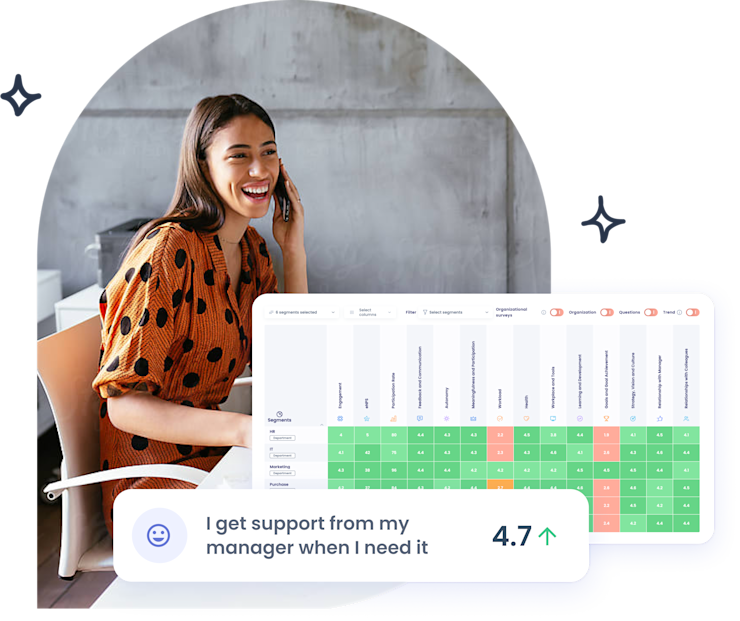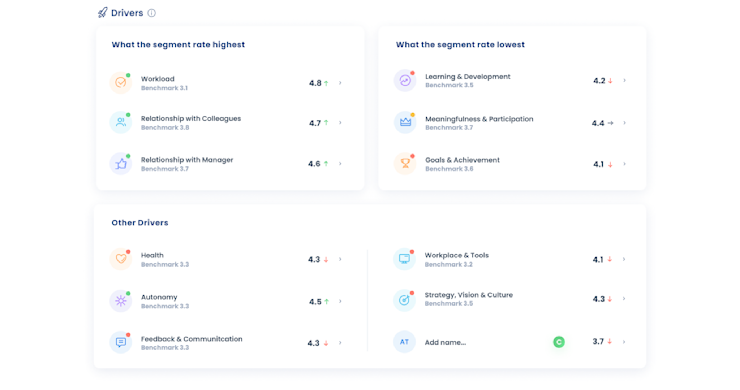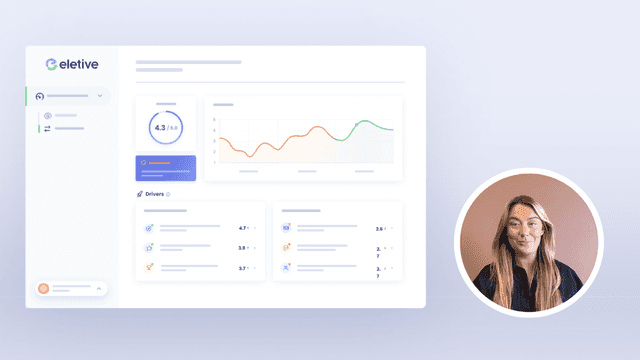A highly engaged retail workforce leads to increased productivity, improved customer service, and higher levels of customer satisfaction, all of which can drive business growth and success.
In this blog post, we will explore some of the key challenges and opportunities for increasing employee engagement in the retail industry, and we will provide strategies and tools for measuring and improving engagement.
We will also discuss the role of managers in creating a positive and supportive work environment, and we will highlight the importance of employee feedback and communication.
Retail employee engagement and turnover statistics
One of the sectors that have been the most affected by the Great Attrition is frontline retail. Not only was the retail industry severely impacted by the lockdown, but the effects persisted after the pandemic. Research indicates that retail staff shows a 30 percent higher likelihood of leaving their jobs than employees in other sectors. And for employers, this presents a big challenge.
Low engagement and high employee turnover also translate into business outcomes. Retailers with lower frontline employee attrition report higher sales and higher customer satisfaction.
Recommended reading: How employee engagement impacts customer satisfaction
Retail employee engagement: common challenges
High turnover rates: Retail is a fast-paced industry, and employees may not always feel motivated to stay with a company for a long time. This can lead to a high turnover rate, which can be expensive and disruptive for a business.
Lack of clear communication: Retail employees often have to work quickly and under pressure, and they may not always have access to clear and timely communication from management. This can lead to confusion and frustration among employees, which can decrease their engagement.
Limited opportunities for career development: Many retail jobs are entry-level positions with limited opportunities for advancement. This can make it difficult for employees to see a path forward in their careers, which can decrease their motivation and engagement.
Inadequate training and support: Retail employees may not always receive the training and support they need to do their jobs effectively. This can lead to feelings of inadequacy and frustration, which can decrease their engagement.
Poor working conditions: Retail employees may have to work long hours, often in physically demanding environments. This can lead to fatigue and burnout, which can decrease their engagement.
Lack of recognition and appreciation: Retail employees may not always feel valued and appreciated for their hard work. This can lead to feelings of disconnection and resentment, which can decrease their engagement.
Limited opportunities for growth and advancement: Many retail employees may not have access to the same opportunities for growth and advancement as their peers in other industries. This can lead to feelings of stagnation and frustration, which can decrease their engagement.
Managers play a crucial role in improving retail employee engagement
Managers play a crucial role in increasing employee engagement in the retail industry because they are often the ones who are directly responsible for the day-to-day interactions and experiences of employees. As such, managers are in a unique position to create an environment in which employees feel valued, supported, and motivated to do their best work.

5 ways managers can increase employee engagement
Communicate clearly and consistently: Managers should make sure that employees have access to the information and support they need to do their jobs effectively. This can help to reduce confusion and frustration, and can create a sense of transparency and trust.
Provide opportunities for training and development: Managers should provide employees with the tools and resources they need to improve their skills and advance their careers. This can help to increase employees' confidence and motivation, and can make them feel more invested in their work.
Recognise and reward hard work: Managers should make an effort to recognize and appreciate the contributions of their employees. This can be as simple as thanking them for their hard work, or as formal as implementing a rewards program. Either way, it can help to create a positive and supportive work environment.
Encourage open and honest feedback: Managers should create an environment in which employees feel comfortable giving and receiving feedback. This can help to identify and address any challenges or concerns that employees may have, and can create a sense of collaboration and teamwork.
Overall, managers play a critical role in increasing employee engagement in the retail industry by creating a positive and supportive work environment, and by providing employees with the tools and resources that they need to succeed.
Recommended reading: How to reduce employee turnover in retail
Retail eNPS – an global benchmark for employee engagement and employee satisfaction
The employee Net Promoter Score (eNPS) is a valuable benchmark metric for the retail industry because it provides a quick and simple way to measure employees' level of engagement and satisfaction with their work.
The eNPS is based on the Net Promoter Score (NPS), which is a widely used metric for measuring customer satisfaction and loyalty. The eNPS uses a similar approach, but instead of asking customers about their satisfaction with a company's products or services, it asks employees about their satisfaction with their job and their employer.
Recommended reading: How to measure and increase eNPS
There are several reasons why the eNPS is a valuable benchmark metric for the retail industry.
First, it is quick and easy to administer, and it can be used to measure employee satisfaction on an ongoing basis. This allows companies to track changes in employee engagement over time, and to identify areas where improvements are needed.
Second, the eNPS is a widely recognized and respected metric, and it has been shown to be a reliable predictor of business performance. This means that companies that have a high eNPS are likely to be more successful than those with a low eNPS.
Finally, the eNPS provides actionable insights that can be used to improve employee engagement and satisfaction. For example, companies can use the eNPS to identify areas where employees are particularly satisfied or dissatisfied, and they can use this information to make targeted improvements.
Overall, the eNPS is a valuable benchmark metric for the retail industry because it provides a quick and simple way to measure employee satisfaction, it is widely recognized and respected, and it provides actionable insights that can be used to improve employee engagement.
Employee engagement surveys for retail
Employee pulse surveys are a valuable tool for measuring and increasing employee engagement in the retail industry because they provide a quick and effective way to gather feedback from employees on an ongoing basis.
Recommended reading: Employee engagement survey questions – what to ask and why
There are many benefits of implementing pulse surveys for measuring employee engagement in the retail industry.
Pulse surveys provide a quick and easy way to gather feedback from employees. This allows companies to track changes in employee engagement over time, and to identify areas where improvements are needed.
Pulse surveys are a more efficient and cost-effective alternative to traditional employee engagement surveys. Because they are shorter and less frequent, they allow you to gather employee feedback in a way that requires much less time and resources to administer.
Pulse surveys provide real-time feedback that can be used to make immediate improvements. Traditional employee engagement surveys are often administered only once or twice per year, which means that any issues or concerns identified through the survey may not be addressed until several months later. In contrast, pulse surveys provide ongoing feedback that can be used to make timely improvements.
Recommended reading: How intelligent employee engagement surveys can improve your people decisions

Understanding and measuring the drivers of employee engagement
Eletive's employee surveys contain a science-based question battery that measures the 11 drivers of engagement. The survey results are then aggregated into an overall Employee Engagement Index. By doing so, it becomes possible to understand both the overall engagement level, and to identify the areas where there is a potential for improvement, so that you can gradually build a better employee experience and company culture.
Recommended reading:The drivers of engagement – and how to measure them
KIOSK codes make employee surveys accessible for retail staff
A common challenge when it comes to digital employee engagement surveys in retail, is that retail staff often don’t have specific digital devices for work. At Eletive, we offer a convenient solution for this dilemma, that helps increase participation and makes the surveys easily available for everyone.

A KIOSK code is a type of code that can be used in employee surveys to allow blue-collar workers, such as retail staff in different locations, to easily access and complete the survey on a kiosk or other self-service device. This can be particularly useful for employees who may not have regular access to a computer or may not be comfortable completing surveys on a traditional computer or mobile device.
To use a KIOSK code for an employee survey, the employee locates the KIOSK or self-service device, which may be located in a break room or other common area within the workplace. They then enter the kiosk code into the device, which allows them to access and complete the survey.
Using a kiosk code for the surveys improves participation rates among retail staff and other blue-collar workers. This leads to a more accurate picture of the employee opinions in the whole organisatio. Additionally, KIOSK codes can help ensure that all employees, regardless of their job role and level of technical knowledge, can participate in the employee surveys and have their voices heard.
Recommended reading: How to engage blue-collar workers with employee surveys
Eletive – a People Success Platform
Eletive is an intelligent People Success Platform, containing all the tools you need to engage and motivate retail employees and build a high-performing culture. This includes intelligent employee engagement surveys, an anonymous chat for employees, advanced AI analytics to interpret free-text comments, action plans, OKRs, a whistleblowing channel, eNPS surveys, and much more.
Book a demo with our product specialists to learn more!

























